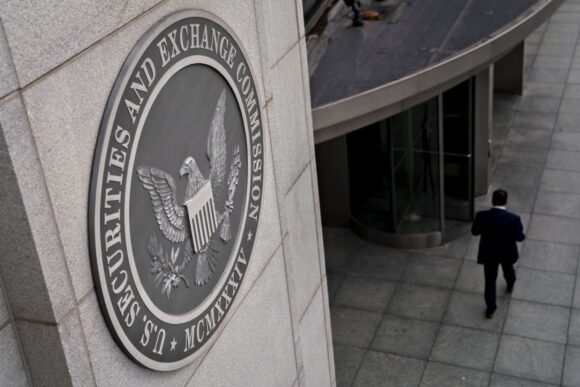

The hack of the U.S. Securities and Trade Fee’s X account earlier this week is shining a lightweight on an uncomfortable fact: Cybersecurity measures at Wall Road’s chief regulator have repeatedly been discovered to be missing.
The company wasn’t totally adhering to federal cybersecurity requirements, together with a requirement that public-facing programs assist multifactor-authentication, as of a assessment by its inner watchdog final yr. A separate, impartial analysis carried out a yr earlier recognized weaknesses in safety measures on the fee, comparable to protocols for stopping unauthorized entry to networks.
The SEC is in no way the one federal company that has come underneath fireplace lately for lax cybersecurity defenses, however its high-profile function in regulating firms and markets throughout the US has made it a very engaging goal for hackers. In 2016, the company suffered a cyberattack that compromised its company filings database and allowed hackers to revenue from private data, in accordance with US prosecutors.
“We simply witnessed the newest in Washington’s technological vulnerabilities yesterday, and an actual low level for the SEC,” Rep. French Hill, an Arkansas Republican, mentioned throughout a gathering of the US Home of Representatives’ digital asset panel on Wednesday. Congressional Republicans had been within the strategy of sending a letter to SEC Chair Gary Gensler demanding an investigation into the hack, he mentioned.
The SEC declined to touch upon its cybersecurity insurance policies. The Federal Bureau of Investigation was trying into the incident on Tuesday through which a hacker took management of the SEC’s deal with on X, previously often known as Twitter. The hacker then revealed a pretend submit that inaccurately mentioned the regulator had accepted plans for spot Bitcoin exchange-traded funds, resulting in a spike within the worth of Bitcoin. (The company accepted ETF plans a day later.)
X mentioned in an announcement that an unidentified individual had compromised the SEC’s X account by buying an related telephone quantity. It additionally famous that the SEC hadn’t activated two-factor authentication — a further layer of safety that has grow to be commonplace for organizations as cyberattacks have elevated. It stays unclear why the SEC hadn’t arrange further authentication.
The takeover of the company’s X account got here at an inopportune time for the SEC, which lately imposed new rules on public firms that require them to reveal cyber incidents inside 4 enterprise days as a part of a broader effort to carry extra transparency to company cyber defenses. In October, the SEC additionally sued SolarWinds Corp. — which was breached by Russian hackers in a 2020 hack that compromised each firms and authorities businesses alike — for allegedly defrauding buyers by downplaying safety dangers.
SolarWinds has disputed the allegations and accused the SEC of “twisting the details.” In an announcement Thursday, Serrin Turner, an lawyer for Latham & Watkins representing SolarWinds, mentioned the SEC hack on Tuesday “underscores how no group’s safety controls can ever be assumed to be completely applied, and why regulators ought to strategy cybersecurity with nice care and humility.”
Gensler has in the meantime been outspoken in regards to the want for firms to beef up digital safety. In October, he posted a reminder on X “to safe your monetary accounts in addition to defend towards id theft and fraud.” One measure he really helpful was multifactor authentication.
Associated: Firms Battle to Kind Methods to Comply With SEC Cyber Guidelines
In 2022, the White Home launched a cybersecurity technique directing businesses to take wide-ranging actions to raised safe their networks. The technique emphasised the necessity for multi-factor authentication, describing it as “a vital a part of the federal authorities’s safety baseline.”
The SEC had made some progress on implementing the actions, its inspector common reported in a September letter. Nevertheless it remained behind on some duties, the report confirmed. Particularly, the SEC had but to configure all of its public-facing programs to assist multifactor authentication as of the audit final yr, the inspector common mentioned.
The SEC had as an alternative argued that it was “usually” in compliance with the usual as a result of all however one in all its system had been migrated over to make use of Login.gov, a broader federal authorities entry web site that requires two-factor authentication, the inspector common’s report reveals. Whereas the SEC deemed the remaining system a restricted threat, the inspector common insisted that phishing-resistant authentication was nonetheless essential to hold hackers from having access to the SEC’s community.
A separate analysis of the SEC’s information safety controls by the agency Kearney & Co. discovered that the company didn’t persistently implement procedures to restrict entry to its programs. The assessment, carried out in 2022, famous that some deficiencies dated way back to 5 years. The precise weaknesses had been redacted, however the research discovered that the vulnerabilities had been brought on partly by Covid-related, work-from-home insurance policies.
Kearney in the end concluded that the SEC’s data safety program didn’t meet a federal definition of being “efficient.”
Final yr, lax information safety measures pressured the SEC to dismiss 42 enforcement circumstances in entrance of its in-house courts. The company discovered that a few of its enforcement employees may see memos they weren’t imagined to see. The SEC mentioned on the time that it regretted the lapse, which was blamed on a scarcity of correct safeguards.
In 2016, a gaggle of japanese European hackers breached the regulator’s database of company filings. The hackers stole private company earnings reviews and traded on them, making greater than $4.1 million, in accordance with court docket filings.
This previous September, the regulator proposed including multifactor authentication to the exact same database.
Picture: Photographer: Andrew Harrer/Bloomberg
Copyright 2024 Bloomberg.
Matters
Cyber
Involved in Cyber?
Get computerized alerts for this subject.